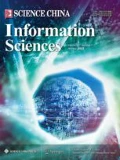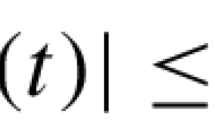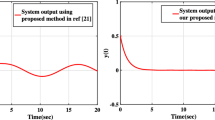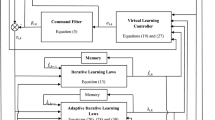Abstract
This paper investigates the problem of finite-time adaptive output tracking control for strict-feedback nonlinear systems with parametric uncertainties. Command signals and their derivatives are generated by a new command filter based on a second-order finite-time differentiator, which attenuates the chattering phenomenon. The parameter estimations are achieved by an immersion and invariance approach without requiring the certainty equivalence principle. The finite-time adaptive controller is constructed via a backstepping design method, a finite-time command filter, and a modified fractional-order error compensation mechanism. The proposed control strategy guarantees the finite-time boundedness of all signals in the closed-loop system, and the tracking error is driven into an arbitrarily small neighborhood of the origin in finite time. Finally, the new design technique is validated in a simulation example of the electromechanical system.
Similar content being viewed by others
References
Kanellakopoulos I, Kokotovic P V, Morse A S. Systematic design of adaptive controllers for feedback linearizable systems. IEEE Trans Autom Control, 1991, 36: 1241–1253
Jiang Z P, Praly L. Design of robust adaptive controllers for nonlinear systems with dynamic uncertainties. Automatica, 1998, 34: 825–840
Ge S S, Hong F, Lee T H. Robust adaptive control of nonlinear systems with unknown time delays. Automatica, 2005, 41: 1181–1190
Tong S C, Li Y M. Observer-based adaptive fuzzy backstepping control of uncertain nonlinear pure-feedback systems. Sci China Inf Sci, 2014, 57: 012204
Krstic M, Kanellakopoulos I, Kokotovic P V. Nonlinear and Adaptive Control Design. New York: Wiley, 1995
Zhou J, Wen C Y. Adaptive Backstepping Control of Uncertain Systems: Nonsmooth Nonlinearities, Interactions or Time-Variations. Berlin: Springer, 2008
Swaroop D, Hedrick J K, Yip P P, et al. Dynamic surface control for a class of nonlinear systems. IEEE Trans Autom Control, 2000, 45: 1893–1899
Wang D, Huang J. Neural network-based adaptive dynamic surface control for a class of uncertain nonlinear systems in strict-feedback form. IEEE Trans Neural Netw, 2005, 16: 195–202
Yoo S J, Park J B, Choi Y H. Adaptive dynamic surface control for stabilization of parametric strict-feedback nonlinear systems with unknown time delays. IEEE Trans Autom Control, 2007, 52: 2360–2365
Ma H, Liang H J, Zhou Q, et al. Adaptive dynamic surface control design for uncertain nonlinear strict-feedback systems with unknown control direction and disturbances. IEEE Trans Syst Man Cybern Syst, 2019, 49: 506–515
Zhang G Q, Deng Y J, Zhang W D, et al. Robust neural output-feedback stabilization for stochastic nonlinear process with time-varying delay and unknown dead zone. Sci China Inf Sci, 2017, 60: 120202
Farrell J A, Polycarpou M, Sharma M, et al. Command filtered backstepping. IEEE Trans Autom Control, 2009, 54: 1391–1395
Dong W J, Farrell J A, Polycarpou M M, et al. Command filtered adaptive backstepping. IEEE Trans Contr Syst Technol, 2012, 20: 566–580
Yu J P, Shi P, Dong W J, et al. Observer and command-filter-based adaptive fuzzy output feedback control of uncertain nonlinear systems. IEEE Trans Ind Electron, 2015, 62: 5962–5970
Yu J P, Zhao L, Yu H S, et al. Barrier Lyapunov functions-based command filtered output feedback control for full-state constrained nonlinear systems. Automatica, 2019, 105: 71–79
Xia J W, Zhang J, Feng J, et al. Command filter-based adaptive fuzzy control for nonlinear systems with unknown control directions. IEEE Trans Syst Man Cybern Syst, 2021, 51: 1945–1953
Astolfi A, Ortega R. Immersion and invariance: a new tool for stabilization and adaptive control of nonlinear systems. IEEE Trans Autom Control, 2003, 48: 590–606
Astolfi A, Karagiannis D, Ortega R. Nonlinear and Adaptive Control with Applications. Berlin: Springer, 2007
Karagiannis D, Astolfi A. Nonlinear adaptive control of systems in feedback form: an alternative to adaptive backstepping. Syst Control Lett, 2008, 57: 733–739
Liu X B, Ortega R, Su H, et al. Immersion and invariance adaptive control of nonlinearly parameterized nonlinear systems. IEEE Trans Autom Control, 2010, 55: 2209–2214
Zhao B, Xian B, Zhang Y, et al. Nonlinear robust adaptive tracking control of a quadrotor UAV via immersion and invariance methodology. IEEE Trans Ind Electron, 2015, 62: 2891–2902
Liu Z, Tan X M, Yuan R Y, et al. Immersion and invariance-based output feedback control of air-breathing hypersonic vehicles. IEEE Trans Autom Sci Eng, 2016, 13: 394–402
Hu J C, Zhang H H. Immersion and invariance based command-filtered adaptive backstepping control of VTOL vehicles. Automatica, 2013, 49: 2160–2167
Huang X Q, Lin W, Yang B. Global finite-time stabilization of a class of uncertain nonlinear systems. Automatica, 2005, 41: 881–888
Min H F, Xu S Y, Gu J, et al. Adaptive finite-time control for high-order nonlinear systems with multiple uncertainties and its application. IEEE Trans Circ Syst I, 2020, 67: 1752–1761
Liu Y, Liu X P, Jing Y W, et al. Direct adaptive preassigned finite-time control with time-delay and quantized input using neural network. IEEE Trans Neural Netw Learn Syst, 2020, 31: 1222–1231
Xia J W, Zhang J, Sun W, et al. Finite-time adaptive fuzzy control for nonlinear systems with full state constraints. IEEE Trans Syst Man Cybern Syst, 2019, 49: 1541–1548
Chen X Y, Huang T W, Cao J D, et al. Finite-time multi-switching sliding mode synchronisation for multiple uncertain complex chaotic systems with network transmission mode. IET Control Theory Appl, 2019, 13: 1246–1257
Li Y M, Li K W, Tong S C. Finite-time adaptive fuzzy output feedback dynamic surface control for MIMO nonstrict feedback systems. IEEE Trans Fuzzy Syst, 2019, 27: 96–110
Wang F, Chen B, Lin C, et al. Adaptive neural network finite-time output feedback control of quantized nonlinear systems. IEEE Trans Cybern, 2018, 48: 1839–1848
Wang F, Chen B, Liu X P, et al. Finite-time adaptive fuzzy tracking control design for nonlinear systems. IEEE Trans Fuzzy Syst, 2018, 26: 1207–1216
Liu Y, Liu X P, Jing Y W, et al. A novel finite-time adaptive fuzzy tracking control scheme for nonstrict feedback systems. IEEE Trans Fuzzy Syst, 2019, 27: 646–658
Zhao L, Yu J P, Shi P. Command filtered backstepping-based attitude containment control for spacecraft formation. IEEE Trans Syst Man Cybern Syst, 2021, 51: 1278–1287
Zhao L, Yu J P, Lin C, et al. Adaptive neural consensus tracking for nonlinear multiagent systems using finite-time command filtered backstepping. IEEE Trans Syst Man Cybern Syst, 2018, 48: 2003–2012
Yu J P, Zhao L, Yu H S, et al. Fuzzy finite-time command filtered control of nonlinear systems with input saturation. IEEE Trans Cybern, 2018, 48: 2378–2387
Yu J P, Zhao L, Shi P. Finite-time command filtered backstepping control for a class of nonlinear systems. Automatica, 2018, 92: 173–180
Qian C J, Lin W. A continuous feedback approach to global strong stabilization of nonlinear systems. IEEE Trans Autom Control, 2001, 46: 1061–1079
Wang X H, Chen Z Q, Yang G. Finite-time-convergent differentiator based on singular perturbation technique. IEEE Trans Autom Control, 2007, 52: 1731–1737
Dawson D M, Carroll J J, Schneider M. Integrator backstepping control of a brush DC motor turning a robotic load. IEEE Trans Control Syst Technol, 1994, 2: 233–244
Acknowledgements
This work was supported by National Natural Science Foundation of China (Grant Nos. 61973179, U1813201, 61973131, 61703059), Japan Society for the Promotion of Science (Grant No. C-18K04212), Taishan Scholar Special Project Fund (Grant No. TSQN20161026), and Natural Science Foundation of Jiangsu Province (Grant No. BK20170291).
Author information
Authors and Affiliations
Corresponding author
Rights and permissions
About this article
Cite this article
Yu, J., Shi, P., Chen, X. et al. Finite-time command filtered adaptive control for nonlinear systems via immersion and invariance. Sci. China Inf. Sci. 64, 192202 (2021). https://doi.org/10.1007/s11432-020-3144-6
Received:
Revised:
Accepted:
Published:
DOI: https://doi.org/10.1007/s11432-020-3144-6




